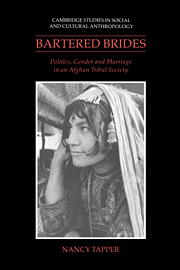Book contents
- Frontmatter
- Contents
- List of illustrations
- List of tables
- List of case studies
- Preface
- Acknowledgements
- Note on transliteration
- List of abbreviations and symbols
- Part I CONTEXTS
- 1 Personal background
- 2 Comparative perspectives on marriage
- 3 Regional background — the Durrani of Saripul
- Part II SOCIAL GROUPS AND MARRIAGE
- Part III IDEOLOGIES OF EQUALITY AND INEQUALITY
- Part IV CASE STUDIES AND STRUCTURAL IMPLICATIONS
- Notes
- References
- Index
- Cambridge Studies in Social and Cultural Anthropology
2 - Comparative perspectives on marriage
Published online by Cambridge University Press: 29 August 2009
- Frontmatter
- Contents
- List of illustrations
- List of tables
- List of case studies
- Preface
- Acknowledgements
- Note on transliteration
- List of abbreviations and symbols
- Part I CONTEXTS
- 1 Personal background
- 2 Comparative perspectives on marriage
- 3 Regional background — the Durrani of Saripul
- Part II SOCIAL GROUPS AND MARRIAGE
- Part III IDEOLOGIES OF EQUALITY AND INEQUALITY
- Part IV CASE STUDIES AND STRUCTURAL IMPLICATIONS
- Notes
- References
- Index
- Cambridge Studies in Social and Cultural Anthropology
Summary
In general the ethnographic and theoretical treatment of marriage in the Muslim Middle East is extremely uneven, making comparative study of a wide range of topics very difficult. However, as Eickelman (1989) has made a systematic and excellent critique of this corpus of materials, his survey does not need to be repeated here. Rather, in this chapter, I want only to set the scene for the ethnographic inquiry which follows by suggesting that the institution of marriage, with its central place in Middle Eastern societies, must be approached from both structural and interpretive perspectives and that the relation between these perspectives must be addressed in the analysis.
The starting point is a central problem in anthropology: the choice of terms that can be used to analyse different cultures and bring them into a frame in which they can be both explained and compared with each other. The futility of attempting universal definitions is now widely accepted; it is not so much that terms like ‘family’ or ‘religion’ can have only a loose analytical value as ‘polythetic classes’ but that they do not translate any significant categories in many cultures, they have no ‘meaning’ and distort or disregard indigenous categories that do.
- Type
- Chapter
- Information
- Bartered BridesPolitics, Gender and Marriage in an Afghan Tribal Society, pp. 14 - 24Publisher: Cambridge University PressPrint publication year: 1991



